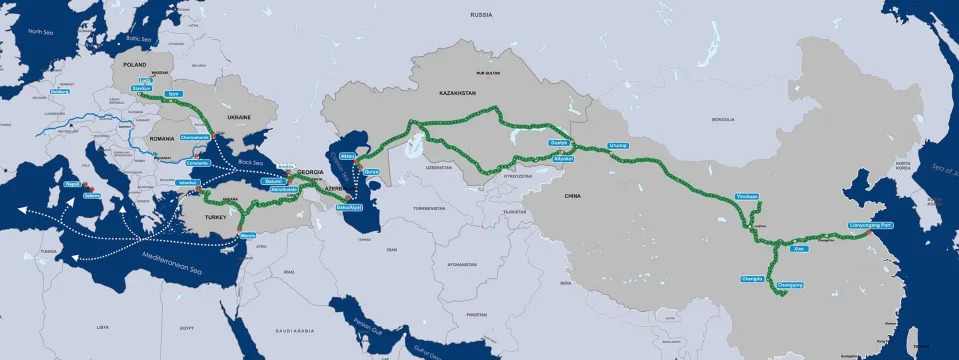Freedom Holdings eyes Hong Kong's dim sum bond market to fund Kazakh optic-fibre project
One of Kazakhstan's biggest privately owned conglomerates is looking to Hong Kong's capital market to finance a multimillion dollar infrastructure project by its telecoms unit, underscoring the city's growing status as a fundraising hub for the Belt and Road Initiative (BRI).
Freedom Holdings, the top Kazakh retail brokerage and investment bank, has engaged China International Capital Corp. (CICC) to help it sell so-called dim sum bonds, or financial instruments denominated in offshore renminbi, said the company's founder and chief executive Timur Turlov. The Almaty-based company may also consider an initial public offering (IPO) in the future, he said.
"Hong Kong is always the benchmark in terms of financial services, [with] prudent regulation," the company's strategic adviser Kairat Kelimbetov said in an interview with the Post, between meetings with officials from the Hong Kong stock exchange and the Securities and Futures Commission. "We know the role Hong Kong is now playing, especially in capital markets, in terms of connecting the stock markets."
Do you have questions about the biggest topics and trends from around the world? Get the answers with SCMP Knowledge , our new platform of curated content with explainers, FAQs, analyses and infographics brought to you by our award-winning team.
The company's telecoms unit Freedom Telecom plans to spend 107 billion tenge (US$236 million) over three years until the end of 2027 on two projects in Kazakhstan: a so-called "hyper highway" for 17 billion tenge that would send data across 3,100 kilometres from the country's west to the east, and a 90-billion tenge Tier III data centre.

An undated photograph of Timur Turlov, the founder and chief executive officer of Freedom Holdings. Photo: Handout alt=An undated photograph of Timur Turlov, the founder and chief executive officer of Freedom Holdings. Photo: Handout>
The fintech firm's coming dim sum bond sale could further propel Hong Kong's renminbi fundraising momentum, as the city's efforts to promote itself as a leading financial centre begin to yield results.
Issuance exceeded 465 billion yuan (US$65 billion) in the first half, a 28 per cent jump from the previous year, according to data from Hong Kong Monetary Authority. Recent offerings from the government of southern China's Guangdong province and rail operator MTR Corp have further contributed to this growth.
"There is much that Hong Kong can contribute to the bright future of your economy," financial secretary Paul Chan Mo-po said on Wednesday during the BRI Summit, attended by dozens of officials including Kazakhstan's Vice-Minister of National Economy Arman Kassenov. "With a diverse equity, bond, and currency market, we provide an ideal environment for more governments and companies to raise funds for infrastructure, green transition, and community projects."

The Trans-Caspian international transport route, or the East-West Middle Corridor. Photo: https://middlecorridor.com/en alt=The Trans-Caspian international transport route, or the East-West Middle Corridor. Photo: https://middlecorridor.com/en>
Freedom's proposed data centre, which will commence service in 2027, is located in Aktau, a port city on the shores of the Caspian Sea in southwestern Kazakhstan. Aktau is also the starting point of the Trans-Caspian Fiber Optic Cable, a submarine cable that runs for 380 kilometres on the seabed to Sumgayit city in Azerbaijan.
Developed by state-backed Kazakhtelecom and AzerTelecom at an estimated cost of US$50.6 million, the cable has the capacity to send data at 400 terabits per second, and forms part of the so-called Digital Silk Road linking mainland China with Central Asia.
The hyper highway is "the final piece" needed to fully connect Central Asia with the Middle East and Europe, and will offer a unique opportunity to facilitate direct traffic between China and Europe while bypassing Russia once finished, Turlov said, without divulging financial details.
"The new cable should offer a shorter route from the China border to the Caspian Sea, avoiding major cities to ensure smooth transit," he said in Hong Kong. "There is a lot of demand from both the government and private sector for better connectivity as well."
Beijing launched the Digital Silk Road project in 2015 in a bid to bolster connectivity and promote trade and economic integration within Belt and Road Initiative nations. It signed a series of strategic agreements with member states earlier this year to collaborate on various fronts including e-commerce to digital infrastructure.
Kazakhstan has also relaxed regulations in its telecommunications sector in recent years, with the government supporting the advancement of fibre, mobile, and fixed wireless access networks to propel digital economy growth, Turlov said.
"We want to participate in building this transit backbone," Turlov said. "There's definitely not enough connectivity in our country yet."
Freedom also operates an online brokerage business called Tradernet, which allows retail investors to trade equities and exchange-traded funds in a dozen global exchanges including the New York Stock Exchange, Nasdaq, the London Stock Exchange and the Deutsche Boerse.
Freedom is interested in providing its customers with access to Hong Kong's stock exchange some time in the "next six to 12 months," Turlov said.
This article originally appeared in the South China Morning Post (SCMP) , the most authoritative voice reporting on China and Asia for more than a century. For more SCMP stories, please explore the SCMP app or visit the SCMP's Facebook and Twitter pages. Copyright © 2024 South China Morning Post Publishers Ltd. All rights reserved.
Copyright (c) 2024. South China Morning Post Publishers Ltd. All rights reserved.




